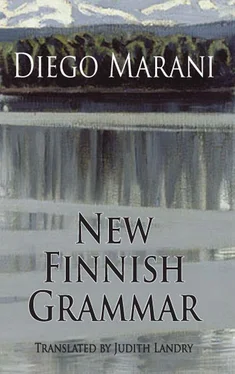It was in the early morning, when there was more light, that the chaplain started to give me regular lessons. It was cold in the sacristy, and my hands would go numb; but the hymns warmed my heart, and when the temperature became truly unbearable the chaplain would open the door of a cabinet with glass handles, reach behind a pile of missals and pull out a bottle containing a white liquid. This, I learned, was called koskenkorva and was extremely strong. What was particularly magical about that little bottle was that throughout all those months it remained half-full, as it had been at the beginning, however much we sipped from it. This was the personal miracle worked by the Military Chaplain Olof Koskela.
That antidote against the cold was also very helpful to the pastor in his various asides, when he recited the poems of Yrjö Jylhä or told stories from Finnish mythology. The characters from the Kalevala came most alive for me when that bottle of koskenkorva was out on the table, together with our two thick little glasses. Then the chaplain’s cheeks would flame, and the austere churchman would become another man: the abrupt priestly gestures would disappear, and his body would take on a strange bonelessness, like that of a puppet. His face, too, would crumple into grimaces I never saw him make when he was sober. I cannot comment on the words he used, but I also sensed that his pronunciation altered: slackened by alcohol, his tongue and lips could no longer keep the consonants in place, and the vowels flowed out in streams, barely regulated by soft movements of the glottis. In this way the pages of the old grammar book that the pastor had found for me were overlaid by a personal Finnish grammar of my own, eclectic and many-hued, ranging from hymns to military marches, from stories from myth to excerpts from the Bible, from feats of arms at the battle of Suomussalmi to Olof Koskela’s own childhood memories, when he lived in the city of Vaasa.
The pastor was not just any common or garden Finn: he was part of the Swedish minority which had settled in Finland. He also had Polish ancestors, and perhaps that was why he regarded the Russians as a special threat. He had the deepest distrust for everything that came from the east, the wind included.
‘The word east means nothing on its own. In our language you have to be more specific. Itä means the east in general, Kaakko means the precise point where the sun rises. If we have two distinct words for east in Finnish, it is so as to avoid having to use the same word both for dawn, and for the direction from which the Slav invasions come,’ as he explained to me one day. He used the map on the wall to give me his own personal reading of the migrations which had peopled Europe, talking of Finno-Ugrians and Ural-Altaics as though they were friends known to him personally, as individuals. He would make the most far-fetched connections, unveiling secret plots and colourful intrigues which I, while knowing nothing about them, instinctively felt I should not take seriously.
‘For example, do you know the difference between the Turks and the Japanese? None! They’re both Altaic peoples! It’s just that the Turks veered off to the left and the Japanese to the right! And they’re both sworn enemies of the Russians. Together they could have held sway over Asia! Their great mistake was to run off, one here and one there, leaving a feeble trail of weak and scattered people in their wake. My goodness! If only the Seljuks had stopped in Samarkand! Today the Slavs would all be on the other side of the Urals, and Finland would extend as far south as Moscow, which was indeed a Finnic city! Because we Finns are also descended from the Altaic peoples! It was the Slavs who cut us off from our original stock by forcing us to migrate northward!’
Nor did the pastor restrict himself to ushering me down the winding lanes of Finnish grammar. Speaking a language all his own, seasoned with a wide range of gestures and images taken from his books, he also provided me with an equally original vision of the world. He too clearly relished our daily lessons, possibly because he had been a teacher before the war and could hardly believe that he now had a pupil all to himself, a school all of his own. The sacristy behind the church had become the pastor’s own private educational establishment, a Greek philosophical academy transported northwards to the snow, where instead of sitting in the shade of an olive tree or on the steps of a temple, we would be stamping our feet because of the cold and sometimes be able to see our breath.
These pages also contain pencil drawings, unsophisticated but extremely elaborate and detailed. They are usually landscapes, though their locations are difficult to pinpoint with any precision. They would seem to be views of the military hospital, seen from the road; in one the church in the courtyard can be made out. Others are scenes from the Kalevala, partly copied from the illustrations in Koskela’s copy. Further on in the manuscript there are fewer drawings, as though the author had abandoned the pencil for the pen as he gradually acquired the ability to express himself in words. The pages which follow give an example of one of Pastor Koskela’s language lessons. Never have I heard Finnish described so affectionately, so forcefully. Returning to my country after all these years, I found the language altered superficially, but basically unchanged. I went towards it as one might approach the object of some long-lost love, afraid, on reacquaintance, that I might regret the time and pain expended upon it, or, worse still, that I might realize that it had not been worth that pain. Instead, I discovered with relief that I was still in thrall to those chipped sounds, those words eaten away by ice and silence; that I was still able to free my mouth from the harsh grimace required by German and allow the soft, rich vowels of my own language to blossom from it. A learnt language is just a mask, a form of borrowed identity; it should be approached with appropriate aloofness, and its speaker should never yield to the lure of mimicry, renouncing the sounds of his own language to imitate those of another. Anyone who gives in to this temptation is in danger of losing their memory, their past, without receiving another in exchange.
One evening after mass the chaplain put many more logs into the stove than was actually allowed, and leant his feet up against it. He gestured to me to sit down on the bench beside him.
‘This was how the runoilija , the old singers of the Kalevala , told their tales: facing each other, with the koskenkorva between them,’ he began, placing the bottle from the cabinet with glass handles on the bench. Then he went on:
‘A good song is a song that is soon done, one that does not overstay its welcome. It is better to stop in time than to be interrupted in full flow, they said. You who wish to learn Finnish should know this, because Finnish is one single, unbroken song. Finnish is a language which should only be sung, that is its true form, its morphology. To speak it is like the prose version of a poem. It is for savages who know nothing of poetry.’
He spoke, drank and refilled his glass; he seemed to be looking through it, holding it between two fingers like some precious phial. At times he would pause, clutch my arm, draw closer to me and mutter a sentence under his breath. Widening his eyes, he would look around him, as though trying to see beyond what was around us, as though hearing the sounds of a world from which we were debarred, which existed just a millimetre away from our own. I did not understand his every word, but I saw that he was happy to be speaking, and that was enough for me. It made me happy too.
‘Like so many glass vessels, forms contain the liquid that is words, which otherwise would seep away, dissolving into silence. The forms of a language inevitably have repercussions upon the speaker, it is they which mould his face, his land, his habits, where he lives, what he eats. The foreigner learning Finnish distorts his own bodily features; he moves away from his original self, may indeed no longer recognize it. This does not happen studying other languages, because other languages are merely temporary scaffolding for meaning. Not so for Finnish: Finnish was not invented. The sounds of our language were around us, in nature, in the woods, in the pull of the sea, in the call of the wild, in the sound of the falling snow. All we did was to bring them together and bend them to our needs. When God created man, he did not bother to send any men up here. So we had to do what we could to struggle free of defenceless matter on our own. In order to gain life, we had to suffer. First came trees, lakes, rocks, wind. Becoming human all on our own was no joke. Finnish is a solid language, slightly rounded at the sides, with narrow slits for eyes, like the houses in Helsinki, the faces of our people. It is a language whose sounds are sweetish and soft, like the flesh of the perch and trout we cook on summer evenings on the shores of lakes whose depths are covered in red algae, the colour of the hunters’ houses and the berries which bead from the bushes in summer. Finland is a cuttlefish bone, a great concave stone within whose sandy womb trees sprout like mould beneath the endless northern light. Nibbled away by ice and ground into thousands of tiny islands, this is the figure that it cuts on the map next to plump Russia and bony but sturdy Scandinavia. Finland is what remains of something else: take away the Slavs, the Scandinavians, the Orthodox, the Catholics, the sea salt, the birch forests, scrape off a few hundred thousand tons of granite and what you are left with is Finland. If you were once Finnish, at some point or other you will find all this within you, because all this is not stored in your memory, it cannot be mislaid. It is in your blood, your guts. We are what remains of something extremely ancient, something which is bigger than ourselves and is not of this world.’
Читать дальше












